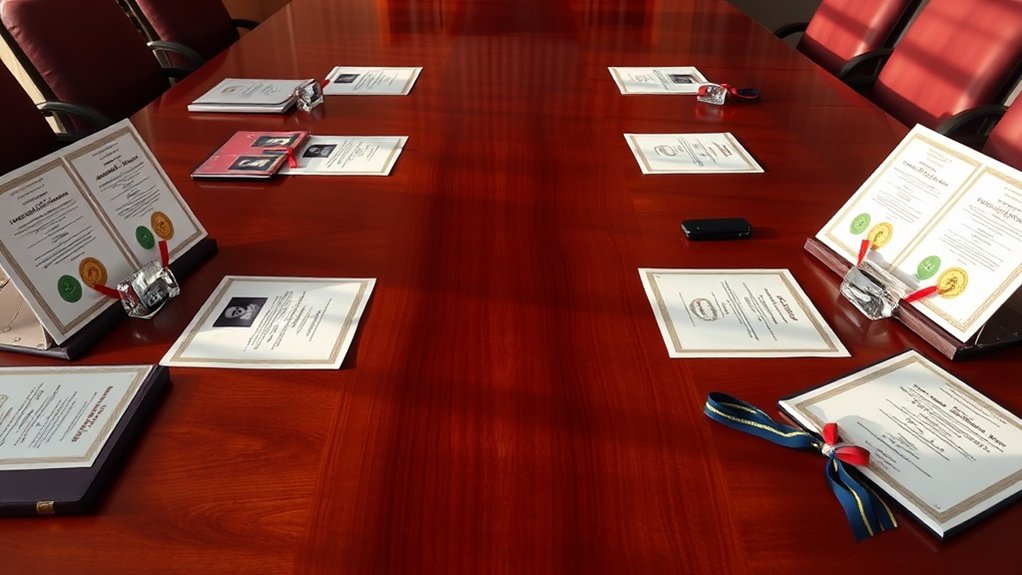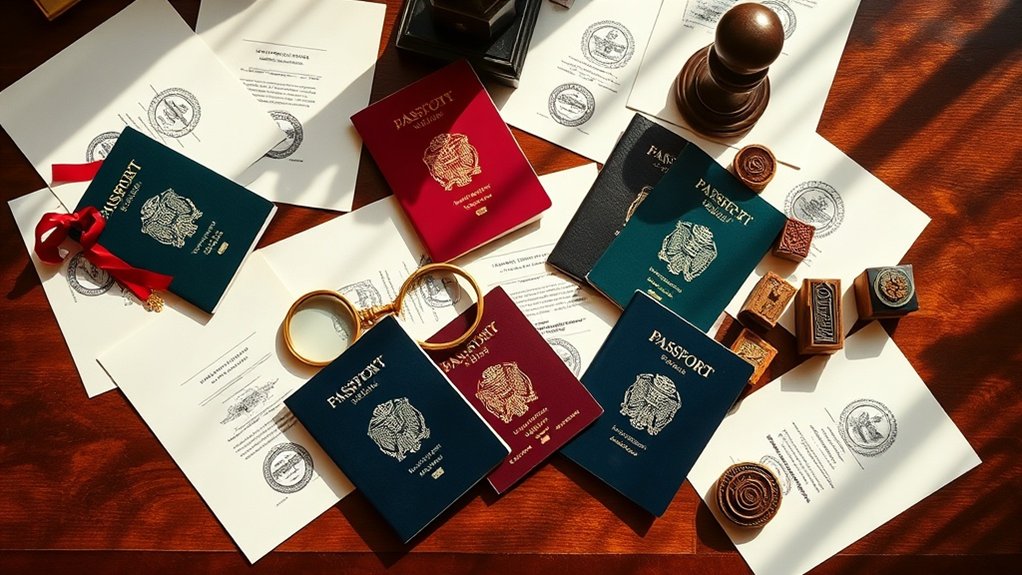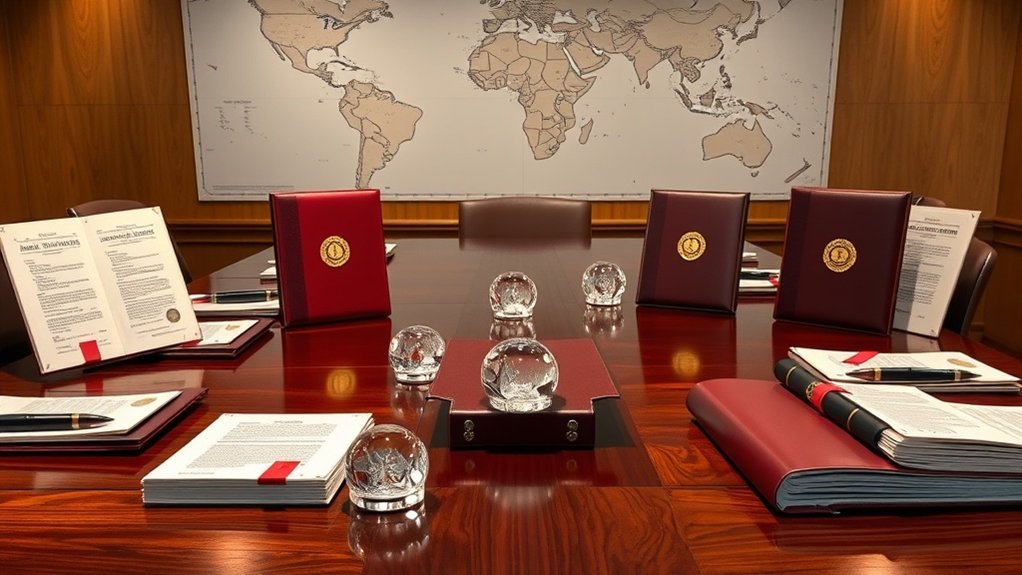You’ll face a maze of contradictory requirements when pursuing police clearances across different countries. Each jurisdiction maintains its own authentication protocols, formatting standards, and processing timelines that can derail your applications without warning. What seems straightforward in one country becomes unnecessarily complex in another, and a single misstep in documentation can cost you months of delays. There’s a strategic approach that sidesteps these pitfalls entirely.
Understanding Apostille vs. Consular Authentication Requirements by Jurisdiction

Why does the same police clearance certificate require different authentication processes depending on where you’ll use it? The answer lies in international legal frameworks that govern document recognition between countries.
If you’re submitting your police clearance to a Hague Convention member country, you’ll need an apostille—a standardized certificate that validates your document’s authenticity. The apostille process is streamlined since all 120+ member countries recognize this unified system.
However, when your destination country isn’t part of the Hague Convention, you’ll face consular authentication instead. This requires multiple steps: notarization, state authentication, and finally, legalization at the destination country’s consulate or embassy.
Countries like China, UAE, and several African nations require consular authentication. Meanwhile, most European countries, Australia, and the United States accept apostilles. You must research your specific destination’s requirements before beginning the authentication process to avoid costly delays.
Given the complexity of these requirements and the potential for costly mistakes, seeking specialized assistance from immigration professionals can help ensure your documents are properly authenticated for your specific jurisdiction.
Country-Specific Formatting and Documentation Standards for Police Clearances
Beyond authentication requirements, each country maintains distinct formatting and documentation standards that directly impact your police clearance’s acceptance. You’ll encounter varying expectations for official letterheads, specific language requirements, and mandatory inclusion of particular details like fingerprint classifications or criminal record categories.
Some jurisdictions require bilingual certificates with certified translations, while others accept only documents in their native language. Date formats, signature placements, and seal positioning can trigger rejections if they don’t match local conventions. You’ll find that certain countries mandate specific paper types, security features, or digital verification codes.
Documentation timeframes also vary significantly—some nations accept certificates valid for six months, while others require documents issued within 90 days. Understanding these nuanced requirements prevents costly delays and resubmissions. You’ll need to research each destination country’s precise formatting standards before requesting your police clearance to ensure seamless processing and acceptance.
For investor visa applications like the EB-5 visa, comprehensive background checks with properly formatted police clearances are essential components of the documentation requirements that must adhere to U.S. Consulate guidelines.

When you’re obtaining police clearances from multiple countries, you’ll encounter vastly different processing times that can range from a few days to several months. Cross-border processing delays often compound these issues, especially when documents must travel between countries or when local authorities experience backlogs. You’ll also need to factor in additional time for document authentication requirements, which may include apostille services, consular legalization, or notarization depending on your destination country’s specific demands. For Brazilian immigration specifically, these translated documents must be registered with the Federal Police within 90 days of arrival to obtain your National Migratory Registration Card.
Cross-Border Processing Delays
Although each country maintains its own unique system for issuing police clearances, you’ll face significant delays when processing requirements across multiple jurisdictions. Cross-border coordination often creates bottlenecks that extend your timeline beyond initial estimates. When documents require authentication from multiple countries, each nation’s processing schedule affects the overall completion date.
You can’t control diplomatic mail delays between consulates or embassy processing backlogs that occur during peak seasons. Holiday schedules in different countries rarely align, creating additional waiting periods. Translation requirements add another layer of complexity, especially when certified translators aren’t immediately available.
To minimize delays, you should submit applications simultaneously rather than sequentially. Vieira Braga Advogados can coordinate multi-country submissions and track progress across jurisdictions, ensuring you receive proper documentation within reasonable timeframes despite inherent cross-border complications. Incorrect documentation during this complex process can lead to application denial and further extend your immigration timeline.
Document Authentication Requirements
Document authentication requirements vary dramatically between nations, creating a complex web of procedures that you’ll need to navigate carefully. Each country maintains distinct protocols for validating police clearance certificates, from simple notarization to multi-step apostille processes.
| Country | Authentication Method |
|---|---|
| United States | Apostille through Secretary of State |
| Brazil | Consular legalization + Ministry validation |
| Germany | Apostille Convention certification |
You’ll encounter varying timeframes depending on your destination country’s requirements. Some nations accept straightforward apostilles, while others demand consular legalization involving multiple government agencies. Understanding these differences upfront prevents costly delays and resubmissions. Document rejection often stems from incomplete authentication chains, so you’ll want to verify specific requirements with relevant consulates before initiating the process. For investment-based immigration applications like the EB-5 visa, transparency in fund source documentation is mandatory and requires the same meticulous attention to authentication procedures.
Common Rejection Reasons and How to Avoid Costly Delays in International Applications
You’ll encounter three primary pitfalls that derail international police clearance applications and waste months of processing time. Incomplete documentation requirements trip up most applicants who assume they’ve gathered everything needed, while improper apostille procedures can invalidate your entire submission. Translation certification errors represent the third major stumbling block, often requiring you to restart the entire legalization process from scratch. These documentation mistakes can lead to legal consequences including application rejections, significant delays, and potential complications with your immigration status in Brazil.
Incomplete Documentation Requirements
When governments reject police clearance applications, incomplete documentation stands as the primary culprit behind these costly setbacks. You’ll face immediate rejection if you’re missing required identity documents, proof of residence, or payment receipts. Each country demands specific paperwork—Brazil requires CPF documentation, while the UK needs proof of address within certain timeframes.
You can’t assume standard documents will suffice across all jurisdictions. Some nations require notarized translations, while others demand original certificates only. Missing apostille certifications will derail your application instantly.
Double-check your submission against the official requirements list before filing. Create a comprehensive checklist and verify each document’s validity period. Don’t submit expired identification or outdated address confirmations—these guarantee rejection and force you to restart the entire process, adding weeks to your timeline. Specialized legal assistance reduces risks and enhances security by ensuring all documentation meets country-specific requirements before submission.
Improper Apostille Procedures
Although apostille procedures seem straightforward, improper execution triggers automatic rejections that can derail your international police clearance timeline. You’ll face delays when submitting documents to incorrect apostille authorities, as each country designates specific competent authorities for different document types. Police clearances often require authentication through justice ministry offices rather than foreign affairs departments.
Common mistakes include failing to verify original signatures before apostille submission, using photocopies instead of certified originals, and submitting documents with incomplete notarization chains. You must ensure your police clearance bears proper authentication seals and signatures that apostille authorities can verify.
Pre-submission verification prevents costly reprocessing fees and timeline extensions. Always confirm your destination country’s apostille recognition status and specific formatting requirements before initiating procedures. Given that Brazilian immigration laws are frequently changing and require detailed attention to avoid bureaucratic issues, seeking professional guidance can help ensure your documentation meets current requirements and increases your chances of successful processing.
Translation Certification Errors
Translation certification errors represent one of the most frequent causes of international application rejections, often stemming from inadequate translator qualifications or improper certification protocols. You’ll encounter problems when using uncertified translators or those lacking proper credentials for legal documents. Many applicants mistakenly assume any bilingual person can certify translations, but most countries require sworn translators, court-certified professionals, or notarized translations from qualified linguists.
You must verify your translator’s credentials match the receiving country’s requirements. Some nations demand specific certification bodies, while others require notarization or apostille stamps on translations themselves. Don’t overlook formatting requirements—certain countries expect literal translations preserving original document structure, while others prefer adapted formats. Always confirm translation standards before submission to prevent costly resubmissions and delays. Specialized lawyers provide crucial assistance in gathering necessary documentation for visa applications and ensuring adherence to constantly changing immigration laws throughout the certification process.
Essential Documentation Requirements for Cross-Border Legal Compliance
Why do immigration officers, employers, and legal authorities across different countries demand such specific documentation standards? You’re dealing with multiple jurisdictions that each maintain distinct legal frameworks, security protocols, and verification processes. Your police clearance must meet exact specifications because these documents serve as primary evidence of your criminal history status across borders.
You’ll need original certificates with official seals, proper apostille authentication, and certified translations matching the destination country’s requirements. Each nation’s embassy or consulate maintains specific formatting demands, including particular fonts, paper types, and authentication stamps. You can’t substitute documents or use alternative formats—compliance isn’t negotiable.
Your documentation package must include sequential chain-of-custody verification, proving authenticity from issuance through final submission. Missing elements like notarization, improper seal placement, or incorrect translation formatting will trigger immediate rejection. You’re navigating complex international legal requirements where precision determines success.
Working with specialized legal guidance ensures compliance with Brazilian legislation and increases your chances of successful outcomes when managing these intricate documentation requirements.
Expert Strategies for Managing Complex Multi-Country Police Clearance Requests

Managing documentation across multiple countries simultaneously requires strategic coordination that goes far beyond collecting individual certificates. You’ll need to establish a master timeline that accounts for each country’s processing speeds, with fastest-processing nations initiated last to synchronize completion dates.
Create parallel application streams rather than sequential ones. You can’t afford to wait for one country’s clearance before starting another’s process. Submit applications simultaneously while tracking each jurisdiction’s unique requirements for apostilles, consular authentication, or direct government validation.
Designate specific representatives in each target country to monitor progress and handle urgent issues. You’ll often encounter unexpected delays or additional documentation requests that require immediate local intervention.
Maintain digital copies with cloud-based tracking systems that timestamp every milestone. This prevents critical deadlines from slipping through administrative cracks. Most importantly, build buffer time into your project schedule—immigration authorities and courts won’t accommodate your oversight when documents expire during processing.
Leveraging Professional Legal Expertise to Streamline International Background Verification
When international background verification involves multiple jurisdictions with conflicting legal frameworks, specialized immigration attorneys and document authentication experts become essential partners rather than optional consultants. You’ll find that these professionals possess intricate knowledge of country-specific requirements, procedural nuances, and timing constraints that can make or break your application timeline.
Professional legal expertise eliminates costly mistakes that occur when you’re navigating unfamiliar bureaucratic systems independently. Immigration attorneys understand which documents require apostille versus embassy legalization, helping you avoid processing delays. They’ll identify jurisdiction-specific exceptions and expedited processing options that aren’t publicly advertised.
Document authentication specialists maintain relationships with consulates and government agencies, enabling faster turnaround times. They’ll coordinate simultaneous processing across multiple countries, reducing your overall timeline significantly.
You’re investing in efficiency and accuracy when you engage qualified professionals. Their expertise transforms complex multi-jurisdictional requirements into manageable, systematic processes that protect your interests while ensuring compliance.
Frequently Asked Questions
Can Vieira Braga Advogados Assist With Expedited Police Clearance Processing?
You’ll find that Vieira Braga Advogados can assist with expedited police clearance processing through their specialized knowledge of country-specific requirements and established relationships with relevant authorities. They’ll navigate complex bureaucratic processes, ensure proper documentation, and leverage their expertise to accelerate timelines. You can expect them to handle legalization procedures efficiently while maintaining compliance with each jurisdiction’s specific protocols and requirements.
What Are the Typical Legal Fees for Multi-Country Clearance Services?
You’ll typically pay $500-2,000 per country for multi-country police clearance services, depending on complexity and urgency. Fees vary based on the number of countries involved, legalization requirements, apostille needs, and processing timelines. You’re looking at higher costs for expedited services or countries with complex documentation procedures. Additional charges may apply for translation services, notarization, and courier fees between jurisdictions during the clearance process.
Does the Firm Handle Clearances for Countries With Diplomatic Restrictions?
Yes, you’ll find they handle clearances for countries with diplomatic restrictions through specialized channels and alternative procedures. They’ve developed workarounds for nations with limited or suspended diplomatic relations, utilizing third-party authentication services, consular processing in neighboring countries, or remote verification methods. You won’t face roadblocks since they maintain relationships with international networks that can navigate complex political situations and restricted diplomatic access effectively.
Can Police Clearances Be Obtained for Deceased Individuals Through Your Services?
You can’t obtain police clearances for deceased individuals through our services. Law enforcement agencies don’t issue criminal background checks for people who’ve passed away since these documents serve legal purposes for living individuals only. If you’re handling estate matters or legal proceedings involving a deceased person, you’ll need alternative documentation like death certificates or court records rather than police clearances.
What Client Confidentiality Protections Exist for Sensitive Background Verification Requests?
You’re protected by strict attorney-client privilege covering all background verification requests. We maintain confidential file systems with restricted access, encrypted communications, and secure document handling protocols. Your sensitive information won’t be disclosed without written consent or legal obligation. We’ll sign additional confidentiality agreements when needed and ensure third-party verification services meet our privacy standards. All staff members are bound by professional secrecy obligations protecting your requests.
Conclusion
You’ll face countless complications when handling international police clearances alone. Don’t risk rejection due to improper formatting, missed deadlines, or authentication errors. Vieira Braga Advogados eliminates these costly mistakes by managing jurisdiction-specific requirements, apostille processes, and complex multi-country applications. You’ll save time and avoid frustration while ensuring compliance across different legal frameworks. Trust their expertise to streamline your background verification needs and secure the clearances you need for immigration, employment, or travel.

